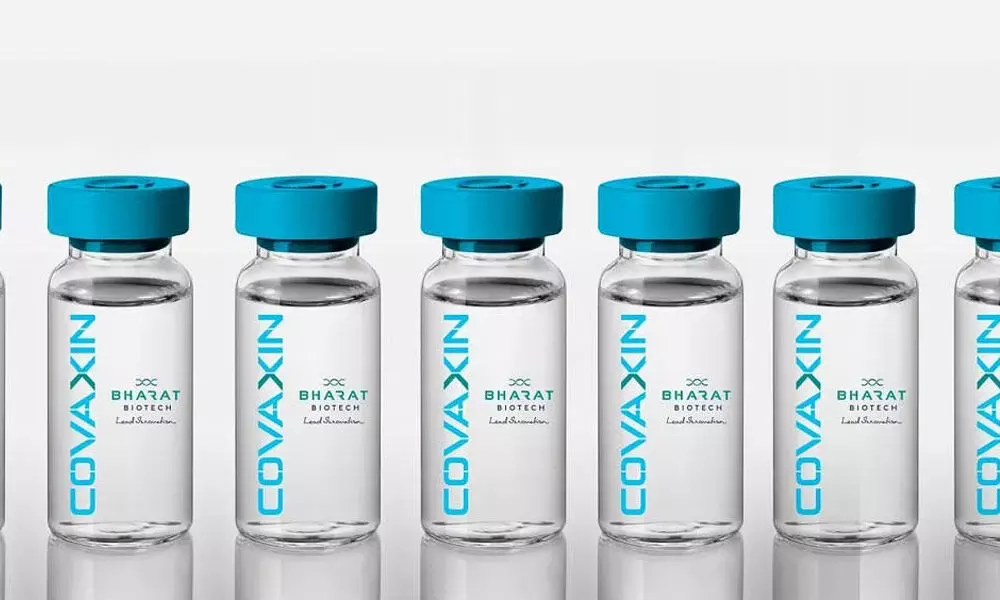Live
- Stokes motivates his team to put in extra effort, says England pacer Potts
- From overcoming setbacks to leading India in U19 Women’s Asia Cup, Niki Prasad's amazing journey
- Constitution debate: PM Modi hails 'Nari Shakti'; makes strong pitch for 'United Bharat’
- Bihar: Inquiry initiated against principal who went to buy veggies during school hours
- TN: DMK postpones executive meet due to heavy rains & Parliament session
- Porous silicon oxide electrodes can fix durability issues in batteries: Researchers
- Jalandhar civic polls: AAP promises launch of 100 e-buses, round the clock water supply
- Economic upliftment of rural women is priority of Tripura govt: CM Saha
- Rajmata Jijabai Trophy: Manipur move to top of the table, T.N register first win
- Italian envoy Baroli hoping to strengthen ties with India through football
Just In

Approval for Covaxin raises eyebrows
India is getting ready for mass vaccination drive on January 13, dry runs have been conducted across several States, centres have been identified and a total of one core health workers along with two crore frontline and essential workers and 27 crore elderly, mostly above the age of 50 years with co-morbidities are eagerly waiting for the big day
India is getting ready for mass vaccination drive on January 13, dry runs have been conducted across several States, centres have been identified and a total of one core health workers along with two crore frontline and essential workers and 27 crore elderly, mostly above the age of 50 years with co-morbidities are eagerly waiting for the big day. Ironically, a survey conducted by an organisation reveals that 69 percent of Indians are reluctant to take the vaccine.
It may be recalled that two vaccines - Oxford-AstraZeneca's Covishield manufactured by Serum Institute of India and Bharat Biotech's Covaxin - against coronavirus infection for restricted emergency use have been approved by India's regulatory authority for medical products, the Central Drug Standards Control Organization (CDSCO) on January 2.
It is of course a huge success of our scientists, research institutes and pharma companies to bring to the forefront indigenous vaccines like Covaxin in less than a year, and they deserve honour abundantly for their outstanding works. Unfortunately, the government and CDSCO seem to have together seriously diluted the hopes of a large number of people, and also dented confidence in vaccines against Covid-19, in particular concerning Covaxin, due to lack of evidence and unsatisfactory scientific basis, non-transparency and concerns around possible political pressure.
A majority of people who participated in the survey said they would wait for another three months and then consider based on date or findings. Many eyebrows are being raised about the Health Ministry's announcement of an extended gap of up to 12 weeks between the first and second doses, whereas the SEC is understood to have recommended the original protocol of 28-days.
The members of the Subject Expert Committee (SEC) of the Drugs Controller General of India (DCGI) had called for additional data from Phase-III trials, but it seems the committee was pressured overnight into reconsidering its decision and giving approval the next day, albeit hedged in by many conditions. It is ironic that while CDSCO's statement shows that the approval was based only on Phase-I and Phase-II data on safety and immune response, but without any efficacy data from Phase-III trials. Pen pushers in the corridors of power and the ICMR have been doggedly defending this decision by stressing safety and arguing, without any evidence, that the design of Covaxin might make it more effective against the new UK mutation.
The ICMR, which incidentally is a co-developer of Covaxin, appears to be a tad biased in its opinion shows a conflict of interest. Even as many health experts, scientists and others are expressing doubts about the efficacy of these vaccines, the government is steamrolling the decision, and is attacking all critics, terming them as opponents of Indian science who should instead be upholding "national pride" over the indigenously developed vaccine.
The achievement of Indian researchers and vaccine manufacturers will undoubtedly be hailed as a major Indian scientific achievement once efficacy data are released but, by the hasty approval without evidence, has shown the Centre in poor light. If anything goes wrong, whatever prestige India may gain abroad for an indigenously developed vaccine will be outweighed and it will come as a huge blow to the country's science, research and regulatory institutions.

© 2024 Hyderabad Media House Limited/The Hans India. All rights reserved. Powered by hocalwire.com







